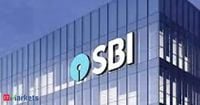Shares of the State Bank of India (SBI) opened lower on Monday, May 5, 2025, slipping by 2.25% to ₹782 following the release of its Q4 FY25 earnings report. The decline reflects investor concerns after the bank reported a 10% year-on-year drop in net profit, primarily due to a significant rise in provisioning expenses.
For the January-March quarter, SBI's net profit stood at ₹18,643 crore, down from ₹20,698 crore a year ago. This decrease has raised alarms among investors, particularly as the bank's provisioning expenses surged to ₹6,442 crore compared to ₹1,610 crore in the previous year. Despite this, the bank's net interest income (NII) showed a slight increase of 2.7% year-on-year, amounting to ₹42,775 crore, while its net interest margin (NIM) fell to 3.15%, down from 3.47% a year earlier.
Analysts have noted that while the earnings report was disappointing, the overall asset quality of the bank remains stable. SBI's gross non-performing asset (NPA) ratio improved to 1.82%, marking a 42 basis point decrease year-on-year, while its net NPA ratio also saw a slight improvement, falling to 0.47% from 0.53% in the previous quarter. The provision coverage ratio was reported at 74.42%, an increase of 60 basis points year-on-year.
Investor sentiment turned cautious following the earnings miss, with market analysts highlighting the impact of increased provisioning on the bank's profitability. Brokerages have begun to adjust their target prices and ratings for SBI. Nuvama, for instance, has maintained a 'Buy' rating, citing a recovery in NIM after two quarters of decline and the highest quarter-on-quarter loan growth among peers. They project a loan growth of 12-13% for FY26, although they anticipate some pressure on NIM.
Motilal Oswal Financial Services (MOSL) also retained a 'Buy' rating for SBI but cut its earnings estimates by 4.6% and 5.0% for FY26 and FY27, respectively. They expect the return on assets (RoA) to be around 1.0% and return on equity (RoE) at 16.1%. Elara Capital has raised its target price for SBI shares from ₹885 to ₹942, maintaining an 'Accumulate' rating, while JM Financial set a target price of ₹960, emphasizing that profitability will remain under pressure due to margin constraints.
Despite the earnings miss, brokerages remain optimistic about SBI's long-term prospects, underscoring the bank's strong fundamentals and the dividend payout of ₹15.90 per share declared for FY25. The dividend provides a cushion for investors amid the current challenges.
SBI Chairman C. S. Setty addressed concerns about the bank's net interest margins, indicating that they may remain under pressure in the upcoming fiscal year, especially given the Reserve Bank of India's recent policy rate cuts. Setty noted that 27% of SBI's loans are linked to the repo rate, which adds to the margin pressure.
In terms of loan growth, SBI reported a 12% year-on-year increase in total advances, with domestic advances growing at 11.56%. However, corporate loan growth moderated to 9% due to prepayments made by corporates aiming to deleverage their balance sheets. Retail personal credit, on the other hand, experienced an 11% growth, including a 14% rise in home loans.
SBI's capital adequacy ratio (CAR) at the end of FY25 stood at a healthy 14.25%, and the bank's board has approved a provision to raise up to ₹25,000 crore in equity capital through various means during the fiscal year 2025-26. This capital raise is expected to support the bank's loan growth ambitions.
The current market reaction indicates a cautious approach among investors, with SBI shares trading at ₹787.15, down 1.61% during early trading hours. This marks a continued downward trend for the stock, which has lost over 2% in the past five trading days, although it is still up more than 5% over the last month.
As analysts assess the implications of SBI's latest earnings report, the consensus appears to lean towards a cautious optimism. The bank's ability to navigate the pressures on margins and maintain asset quality will be critical in determining its future performance. For investors, the current dip in share price might present a buying opportunity, especially given the bank's robust fundamentals and government backing.
In summary, while SBI's recent earnings report has raised concerns regarding profitability due to increased provisioning and pressure on net interest margins, the bank's overall asset quality remains stable, and brokerages continue to express confidence in its long-term growth potential. Investors are advised to keep an eye on upcoming management commentary regarding credit growth and potential slippages before making new investment decisions.





